Iraq advances health security with a new community protection strategy and emergency preparedness plans
2 December 2025, Baghdad, Iraq – Iraq has taken an important step towards strengthening national health security with the development of its first community protection strategy and new action plans for pandemic influenza preparedness and mass gatherings. These efforts represent the country’s most comprehensive move to date to place communities at the centre of preparedness and response in a way that reflects evolving health risks and national priorities.
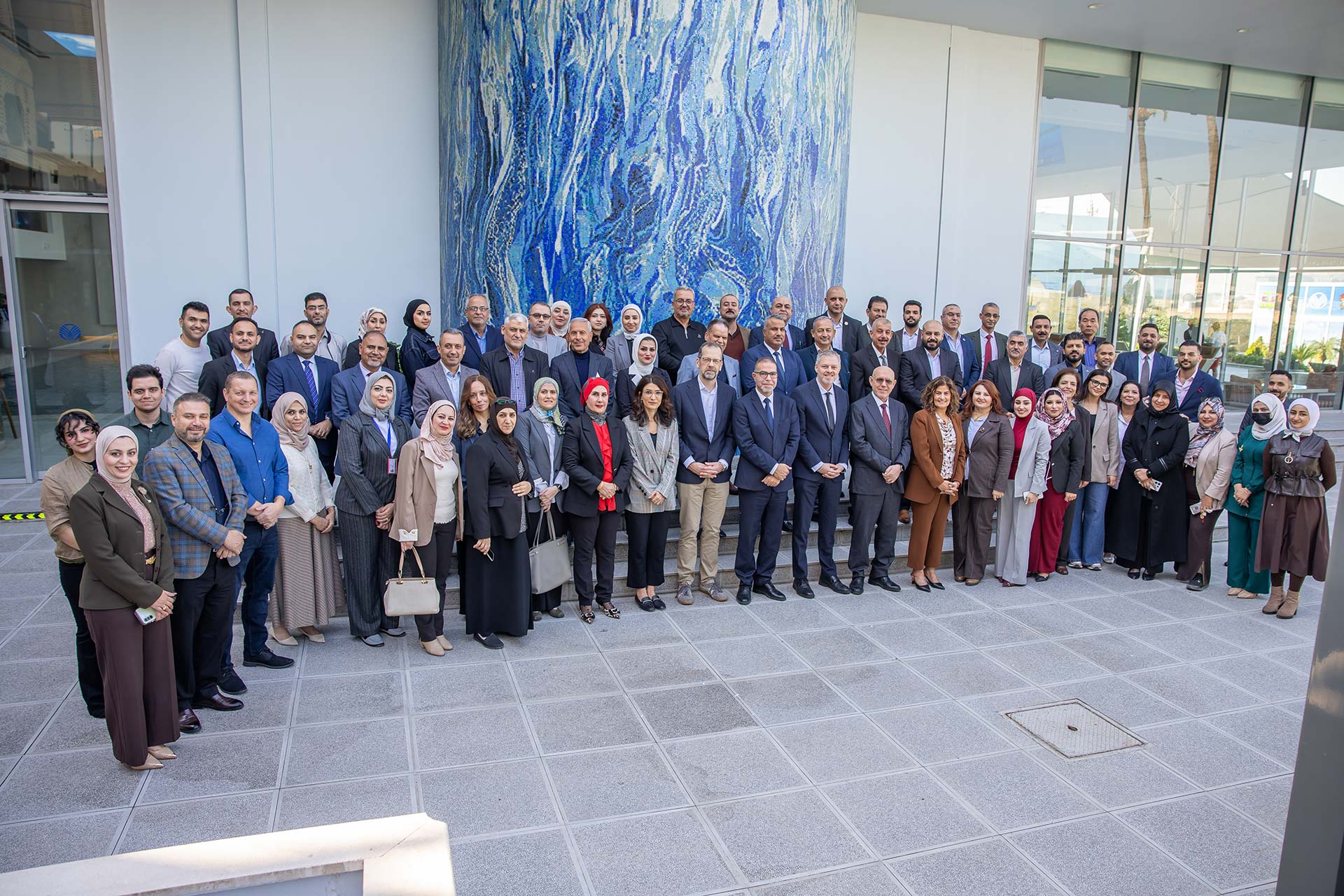 Participants in the national workshop to develop a community protection strategy for health emergencies in Iraq. Photo credit: WHO/Iraq
Participants in the national workshop to develop a community protection strategy for health emergencies in Iraq. Photo credit: WHO/Iraq
To drive work forward, the World Health Organization (WHO) and the Iraqi Ministry of Health, in collaboration with the Robert Koch Institute (RKI), held a 5-day national workshop in Baghdad from the 23 to 27 November 2025. The workshop brought together more than 60 representatives from national authorities, technical experts and community leaders.
Participants reviewed Iraq’s priority health risks, explored ways to strengthen community engagement and practiced rapid decision-making through strategic planning sessions and simulation exercises focused on pandemic influenza, mass-gathering risks and other emerging threats.
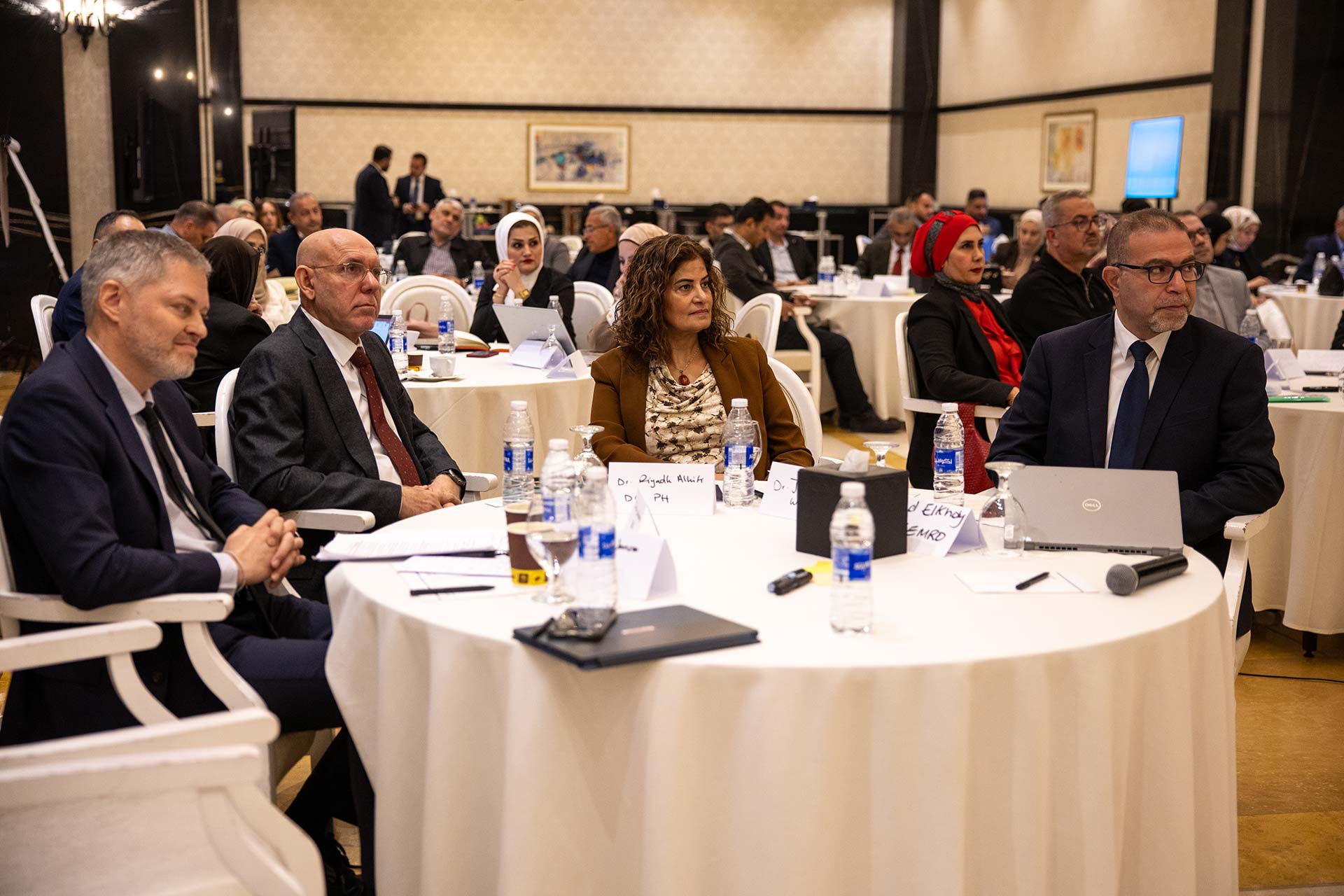 Dr Jamela Al-Raiby, WHO Representative in Iraq, Dr Riyadh Abdulameer Al-Halfi, Director General of the Public Health Directorate at the Iraq Ministry of Health, Amgad Abdalla El-Kholy, WHO Regional Office for the Eastern Mediterranean and Dr Kai von Harbou from WHO headquarters. Photo credit: WHO/Iraq
Dr Jamela Al-Raiby, WHO Representative in Iraq, Dr Riyadh Abdulameer Al-Halfi, Director General of the Public Health Directorate at the Iraq Ministry of Health, Amgad Abdalla El-Kholy, WHO Regional Office for the Eastern Mediterranean and Dr Kai von Harbou from WHO headquarters. Photo credit: WHO/Iraq
Sessions highlighted the importance of incorporating community perspectives into emergency planning to ensure that preparedness plans reflect the needs of local populations. Representatives from public health directorates, communicable disease units, risk communication and community engagement teams and emergency medical services shared insights from their daily work.
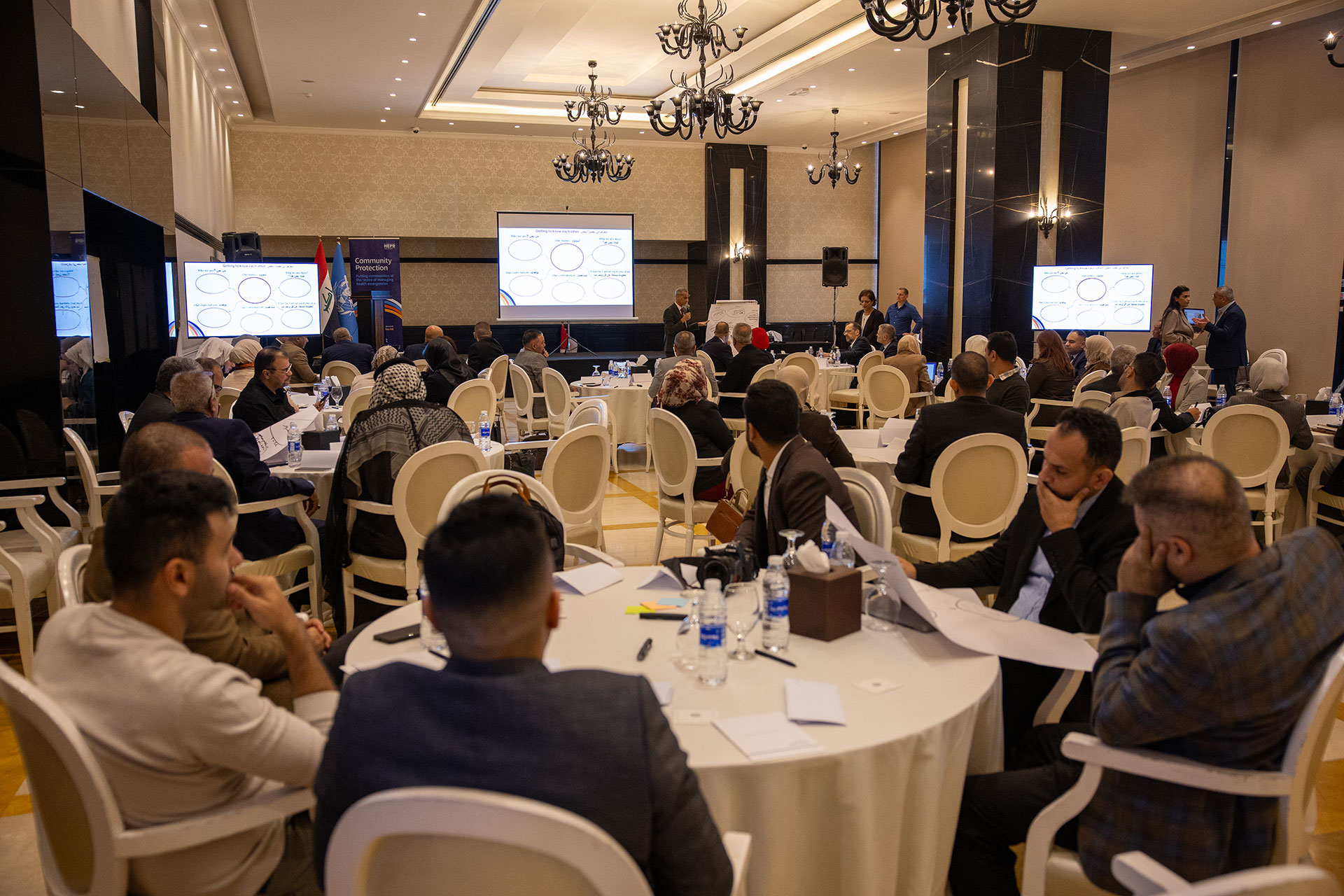 Participants during the national workshop. Photo credit: WHO/Iraq
Participants during the national workshop. Photo credit: WHO/Iraq
Iraq’s complex, interconnected health landscape includes pandemic threats, climate-sensitive diseases, displacement-related vulnerabilities and the pressures that result from hosting religious mass gatherings such as Arbaeen, one of the world’s largest.
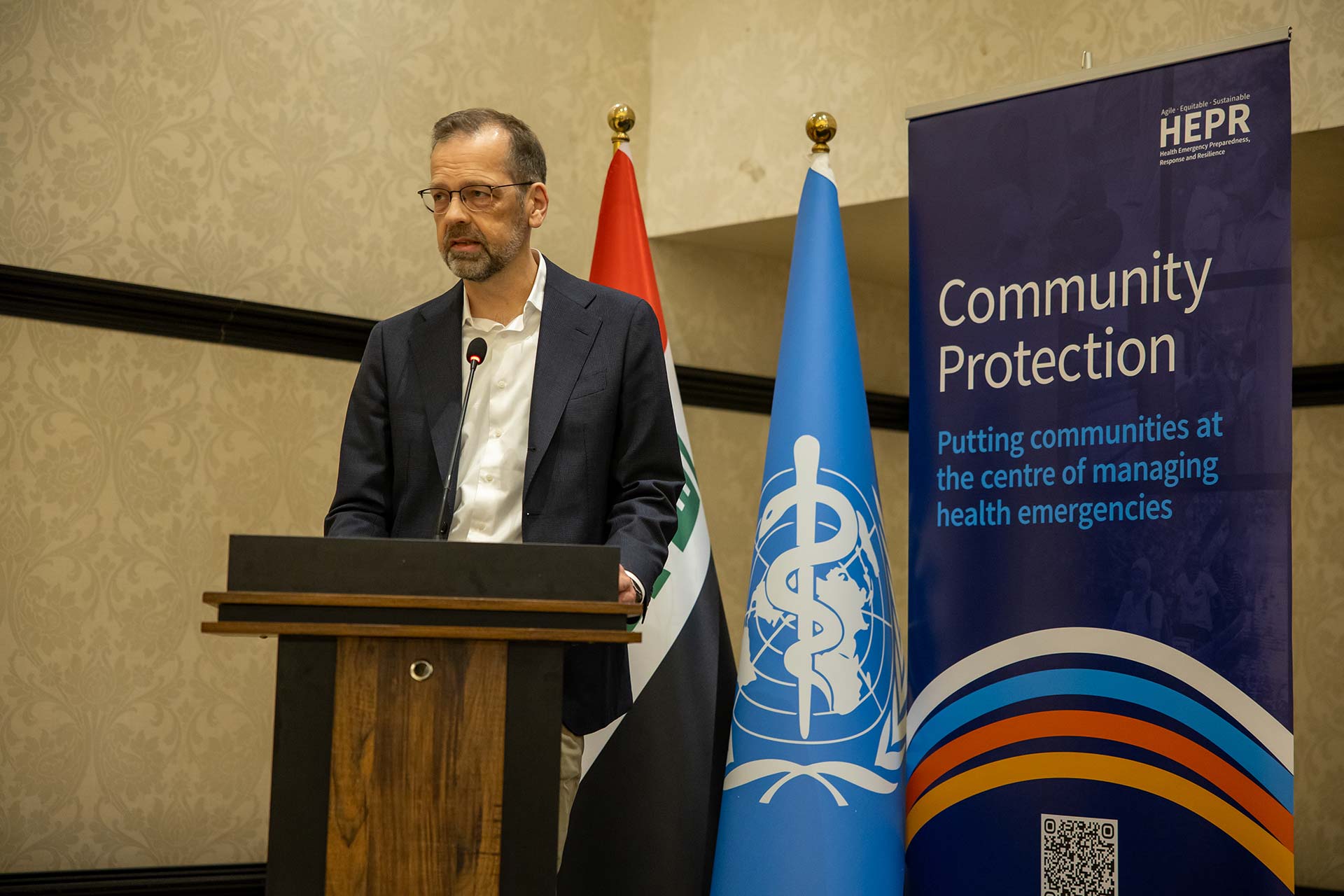 Dr Andreas Jansen, Robert Koch Institute. Photo credit: WHO/Iraq
Dr Andreas Jansen, Robert Koch Institute. Photo credit: WHO/Iraq
WHO Representative in Iraq Dr Jamela Al-Raiby emphasized that “protecting communities during health emergencies should start long before a crisis occurs”.
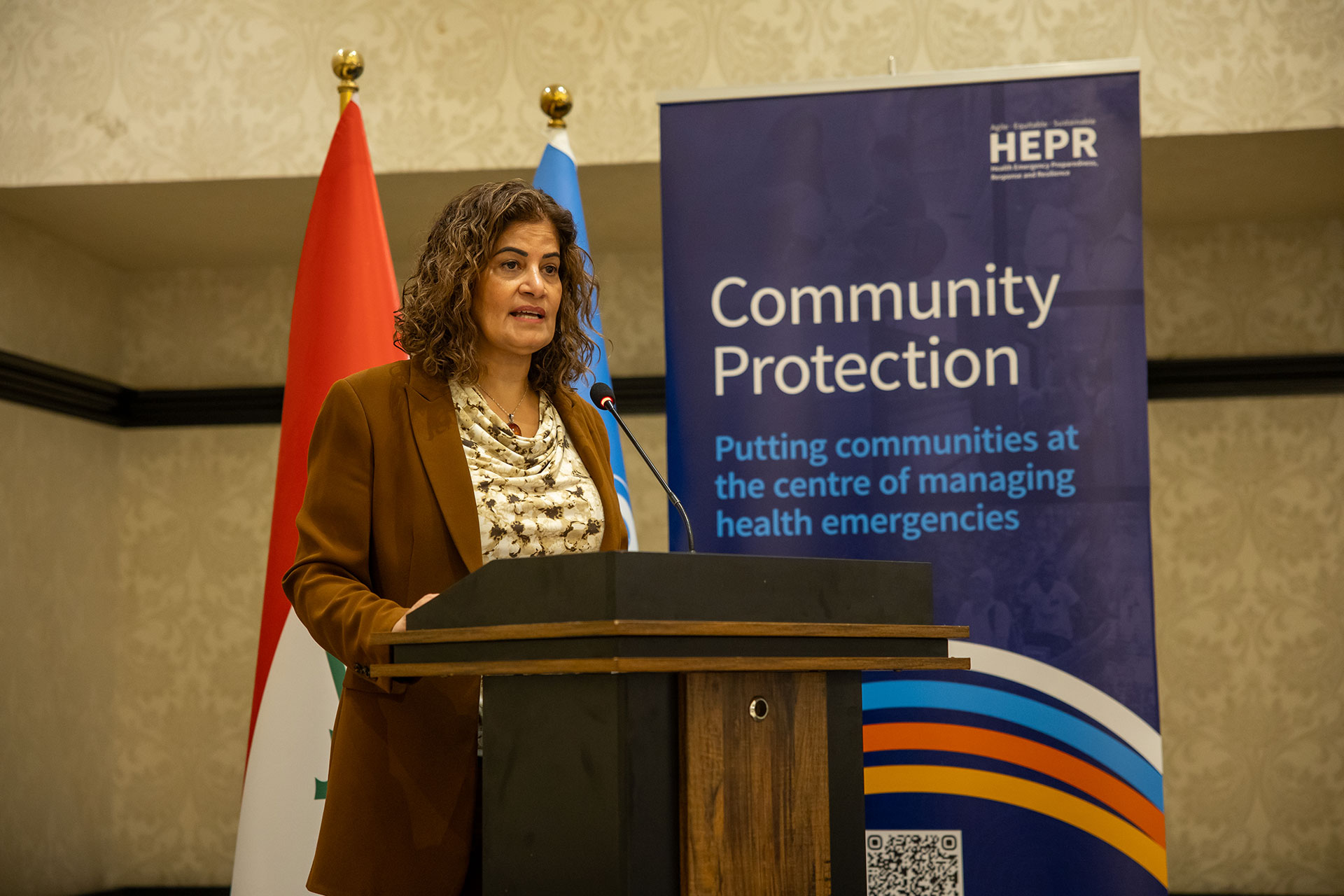 WHO Representative in Iraq Dr Jamela Al-Raiby. Photo credit: WHO/Iraq
WHO Representative in Iraq Dr Jamela Al-Raiby. Photo credit: WHO/Iraq
“This workshop is critical to building a stronger, more resilient system that can respond quickly and effectively when it matters most,” she said.
The joint effort is a step towards building a public health emergency system in Iraq that is better prepared, better connected and more deeply rooted in community needs.
Participating institutions committed to transforming the week’s recommendations into actions that will strengthen Iraq’s capacity to protect communities during future emergencies by harmonizing cross-cutting areas and foregrounding community participation. Partners also acknowledged the value of sustained dialogue and coordination as Iraq advances its preparedness planning.
WHO continues efforts to strengthen climate-resilient, migrant-inclusive health systems in Iraq
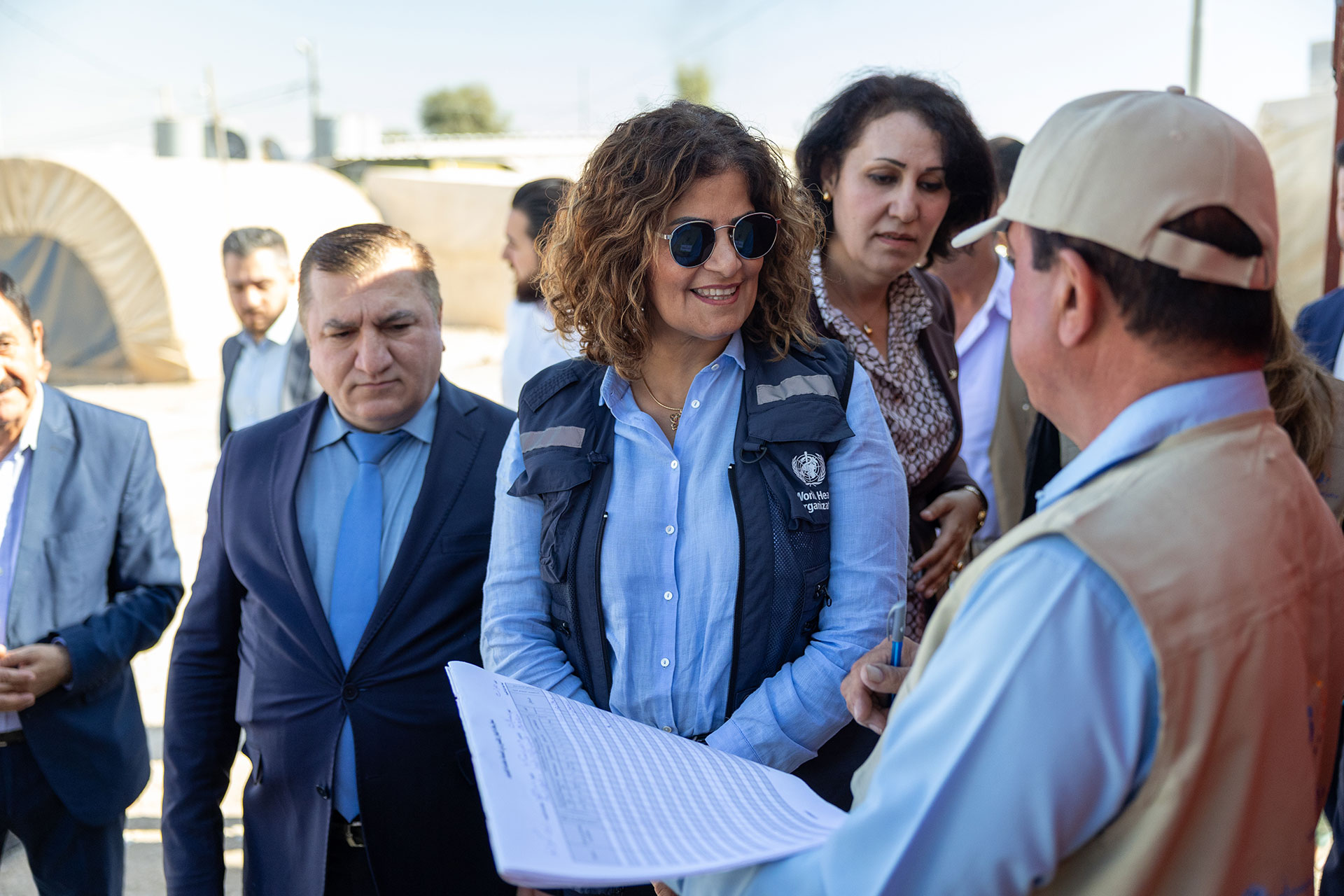 Dr. Jamela Al-Rabie, WHO Representative in Iraq, during one of the field visits16 November 2025 – Through the Harnessing Synergies between Climate Change Adaptation and Risk Reduction in Migrant-Inclusive Health System Responses project, the World Health Organization (WHO), in partnership with the International Organization for Migration (IOM) and the United Nations Office for Disaster Risk Reduction (UNDRR), is supporting Iraq’s efforts to safeguard communities from the mounting health impacts of climate change.
Dr. Jamela Al-Rabie, WHO Representative in Iraq, during one of the field visits16 November 2025 – Through the Harnessing Synergies between Climate Change Adaptation and Risk Reduction in Migrant-Inclusive Health System Responses project, the World Health Organization (WHO), in partnership with the International Organization for Migration (IOM) and the United Nations Office for Disaster Risk Reduction (UNDRR), is supporting Iraq’s efforts to safeguard communities from the mounting health impacts of climate change.
The US$ 3.2 million project, part of the Migration Multi-Partner Trust Fund (M-MPTF), supports the Government of Iraq as it integrates climate change adaptation and disaster risk reduction plans into health policy to ensure host and migrant populations benefit from stronger, more inclusive health systems.
Iraq is grappling with some of the most serious climate conditions in the region. Temperature rises are among the fastest globally. Droughts, water scarcity and dust storms have become more common and severe and are already impacting public health, increasing the incidence of respiratory and waterborne diseases and putting pressure on health facilities and workers. Migrants and internally displaced people are among the most affected.
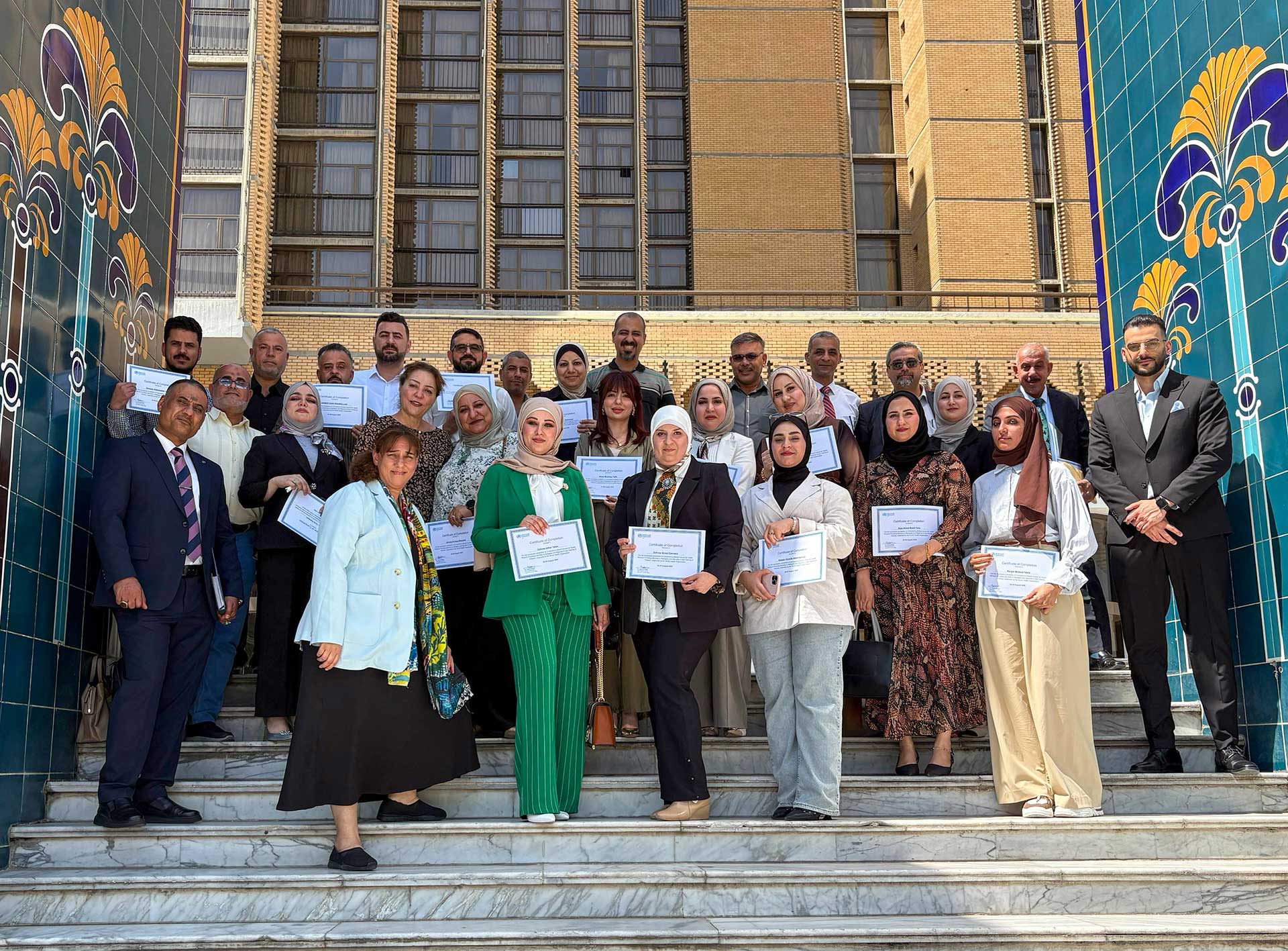 WHO organized a Training of Trainers in Baghdad on Global Competency Standards for Health Workers, equipping providers to better serve refugees and migrants affected by climate changeWHO is joining forces with the Ministry of Health, the Ministry of Environment and other national institutions to advance Iraq’s capacity to address the health consequences of climate change through the development of migrant-inclusive adaptation plans, building the skills of health personnel to respond to climate-related diseases and raising awareness among communities on the health risks associated with climate change.
WHO organized a Training of Trainers in Baghdad on Global Competency Standards for Health Workers, equipping providers to better serve refugees and migrants affected by climate changeWHO is joining forces with the Ministry of Health, the Ministry of Environment and other national institutions to advance Iraq’s capacity to address the health consequences of climate change through the development of migrant-inclusive adaptation plans, building the skills of health personnel to respond to climate-related diseases and raising awareness among communities on the health risks associated with climate change.
“Through our partnership with the Government of Iraq, IOM and UNDRR, WHO is working to ensure that Iraq’s health system is resilient, adaptive and inclusive of everyone, including migrants and displaced people,” said WHO Representative in Iraq Dr Jamela Al-Raiby.
“Strengthening the capacity of the health sector to respond to climate-related risks is essential for protecting lives and supporting sustainable development.”
The project benefits hundreds of health workers across Iraq, particularly in areas such as Basra and the southern governorates which are most affected by climate change. Refugees, migrants and host communities living in places exposed to severe conditions such as drought, dust storms and water scarcity also benefit.
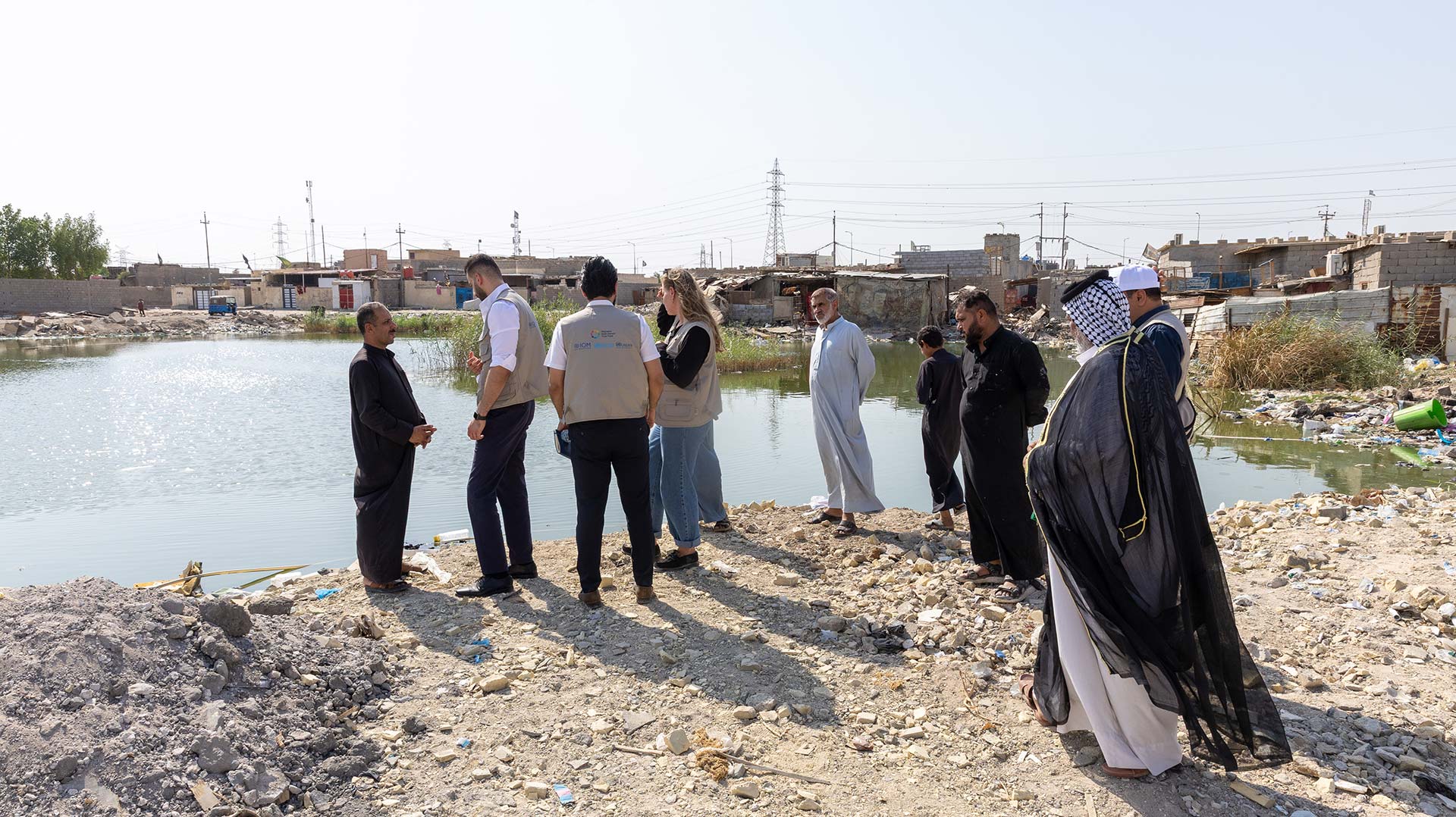 WHO, IOM, and UNDRR, visit to Basra during MMPTFMany health professionals have enhanced their understanding of how climate change intersects with health and migration through the initiative.
WHO, IOM, and UNDRR, visit to Basra during MMPTFMany health professionals have enhanced their understanding of how climate change intersects with health and migration through the initiative.
After taking part in one of WHO’s capacity-building workshops, Dr Nizar Abdulmahdi from the Ministry of Health said the training had deepened his knowledge of climate-related health risks and improved his ability to respond to them in his work.
He noted that the sessions “focused on climate change and its impact on displacement, particularly in Basra and the marshlands, and also addressed the infodemic issue and how to respond to it effectively.”
WHO, in collaboration with the Ministry of Health and the Ministry of Environment, has developed a climate and health action plan for Basra and trained health workers on the links between climate change, migration and health.
Awareness campaigns have targeted migrant and host communities, informing them about the health impacts of heat, water scarcity and air pollution. As part of these efforts, more than 250 students from medical schools in Basra were mobilized through WHO-led risk communication and community engagement (RCCE) campaigns to raise awareness among the people of Basra on the prevention of climate impacts and other public health issues, fostering resilience and informed action at the community level.
Moving forward, WHO emphasizes the importance of integrating mitigation measures alongside adaptation and preparedness actions to reduce emissions from the health sector, promote sustainable and low-carbon health systems and contribute to Iraq’s national efforts to address the root causes of climate change.
These contributions are advancing coordination between the health and environment sectors and accelerating Iraq’s progress towards climate-resilient, inclusive health systems.
National Strategy for Women’s, Children’s and Adolescents’ Health 2025–2030 Launched in Iraq
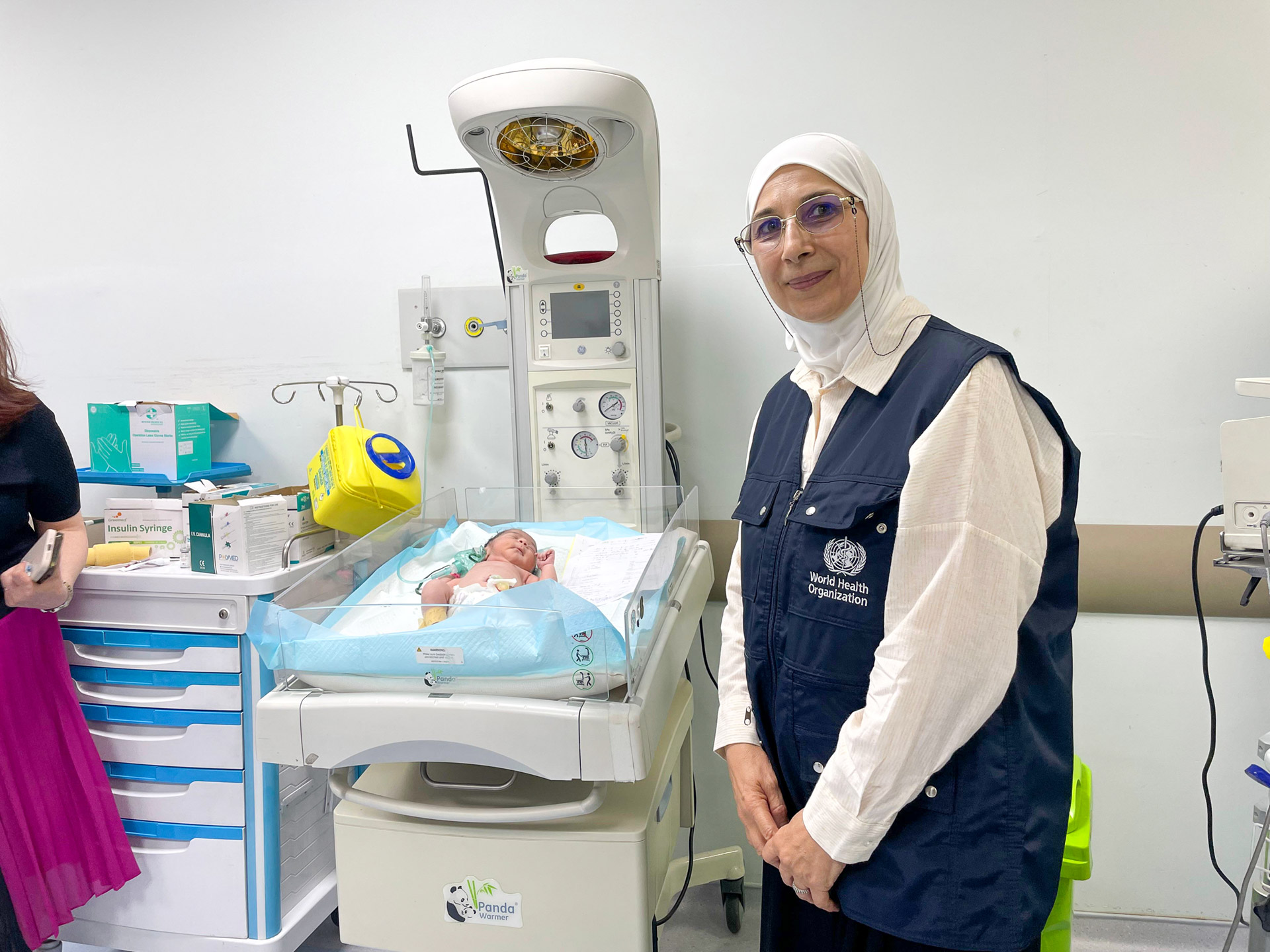 13 August 2025 – In 2025, Iraq launched the 2025–2030 National Strategy for Women’s, Children’s and Adolescents’ Health, marking a significant step in national health sector reform. The strategy, developed under the technical leadership of WHO and in partnership with the Ministry of Health, UNICEF and UNFPA, places population needs at the center of health policy and service delivery.
13 August 2025 – In 2025, Iraq launched the 2025–2030 National Strategy for Women’s, Children’s and Adolescents’ Health, marking a significant step in national health sector reform. The strategy, developed under the technical leadership of WHO and in partnership with the Ministry of Health, UNICEF and UNFPA, places population needs at the center of health policy and service delivery.
The strategy is built on the six pillars of a resilient health system and is supported by a fully budgeted national action plan. Priority actions include expanding access to services in rural, underserved and conflict-affected areas, standardizing essential health services nationwide and strengthening health infrastructure.
“This strategy is a clear demonstration of Iraq’s commitment to building a health system that meets the needs of its most vulnerable populations,” said Dr Jamela Al-Raibi, WHO Representative in Iraq. “With this strategy, Iraq is setting a strong foundation for healthier futures for women, children, and adolescents.”
Through the Health Resources and Services Availability Monitoring System (HeRAMS), Iraq now tracks real-time data to guide the equitable deployment of over 400 000 health workers. Digital platforms such as DHIS2 enable disaggregated data collection by age, gender, and location, supporting more targeted and equitable interventions. Health facilities are being upgraded with essential supplies, equipment, and modern technologies to ensure the delivery of safe and high-quality care.
Strategic financing has been reinforced through a nationally developed costing tool, ensuring that the action plan is fully resourced and financially sustainable.
At Erbil Maternity Teaching Hospital, the upgraded neonatal unit has reduced the neonatal mortality rate from 6.2% to 1.1%. A premature infant born at 26 weeks and weighing 900 grams received specialized care and recovered fully.
The National Strategy represents a firm commitment to ensuring that every woman, child and adolescent in Iraq has access to the care and support needed to survive, thrive and live with dignity.








